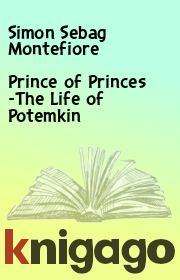Simon Sebag Montefiore - Prince of Princes -The Life of Potemkin
 | Название: | Prince of Princes -The Life of Potemkin |
Автор: | Simon Sebag Montefiore | |
Жанр: | Старинная литература | |
Изадано в серии: | неизвестно | |
Издательство: | неизвестно | |
Год издания: | 2011 | |
ISBN: | неизвестно | |
Отзывы: | Комментировать | |
Рейтинг: | ||
Поделись книгой с друзьями! Помощь сайту: донат на оплату сервера | ||
Краткое содержание книги "Prince of Princes -The Life of Potemkin"
Аннотация к этой книге отсутствует.
Читаем онлайн "Prince of Princes -The Life of Potemkin". [Страница - 253]
[102] The author found what is probably the sole surviving copy of this card, addressed to Countess Osterman, in the archives of the Odessa State Local History Museum.
[103] Potemkin's tsar of gardeners, William Gould, 'lived in splendour' in the Palladian villa Catherine had built for him in the grounds of the Taurida (still called the 'gardener's house') and 'gave entertainment to the nobility'. He died in luxurious retirement at Ormskirk in Lancashire in 1812.
[104] When the Emperor Paul set out to deface the building after his mother's death, these little rooms so disgusted him that he did not ruin them. He simply sealed them and they alone remain today.
[105] Indeed some histories claim that this was the last time they met. In fact, Potemkin remained in Petersburg for three more eventful months.
[106] Some Polish historians regard this condition as a sham to delude Potemkin, because Catherine already knew there would be no war with Prussia. This is clearly not so. England had blinked but not surrendered. The conditions placed on Potemkin's action were entirely reasonable. The accompanying documents discussing the creation of Polish forces to back up a Confederation show how they worked together just before his Taurida ball: he drafted a proposal that required recruitment of Polish forces, to which she added her thoughts in the margin.
[107] Mansour was despatched to Petersburg, and perished three years later in the dungeons of Schliisselburg.
[108] It is possible but unlikely that some of Potemkin's letters to 'Praskovia' quoted earlier were addressed to Praskovia Golitsyna, not Praskovia Potemkina.
[109] Mozart died soon afterwards on 24 November/5 December 1791.
[110] The Beautiful Greek was presumably no longer required - she disappeared as his illness worsened. Branicka probably ordered her to entertain the Polish magnates arriving to see the Prince, f Jeremy Bentham, whose utilitarianism measured the success of a ruler by the happiness he gave to his subjects, would have appreciated this: one wonders if Samuel had discussed the idea with the Prince on one of their long carriage rides across the south.
[111] It is now appropriately Ia§i University's School of Medicine, though others say the autopsy was conducted in the Cantacuzino Palace.
[112] Mikhail Potemkin died strangely in his carriage on his way home from Jassy. His brother Count Pavel Potemkin was later accused of murdering and robbing a Persian prince when he was viceroy of the Caucasus: he wrote a poem pleading his innocence, then died of a fever. Some said he committed suicide, f The almost 4 million of his 'private' income sounds much too low considering Catherine regularly bought his palaces for sums like half a million roubles. The sums of State money were much more than the entire annual revenue of the whole Russian Empire, which usually oscillated between forty and forty-four million roubles - though it was rising fast.
[113] This disappeared a few years after Potemkin's funeral. Two hundred years later in October 1998, the author, assisted by a Rumanian priest and two professors, began to search the Golia church in Jassy and found the board and its beautifully inscribed memorial under a piano behind a pile of prayer books: it was dusty but undamaged.
[114] The top row reads 'Ochakov 1788, Crimea and Kuban 1783, Kherson 1778'. The two in the middle: 'Akkerman 1789' and 'Ekaterinoslav 1787'. At the bottom: 'Bender 1789' and 'Nikolaev 1788'.
--">

